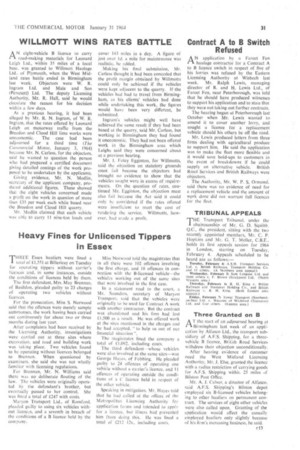WILLMOTT WINS RATES BATTLE
Page 33

If you've noticed an error in this article please click here to report it so we can fix it.
AN eight-vehicle B licence to carry road-making materials for Leonard Leigh Ltd., within 35 miles of a local base, was granted to Willmott Haulage Ltd.. of Plymouth, when the West Midland rates battle ended in Birmingham last week. Objectors were W. R. Ingram Ltd. and Male and Son Wensnett) Ltd. The deputy Licensing Authority, Mr. R. Hall, said he would circulate the reason for his decision within a few days.
At a previous hearing, it had been alleged by Mr. R. N. Ingram, of W. R. Ingram, that the rates offered by Leonard Leigh on motorway traffic from the Breedon and Cloud Hill lime works were uneconomic. The case had been adjourned for a third time (The Commercial Motor, January 3, 1964) because Mr. N. Carless, for the objectors, said he wanted to question the person who had prepared a certified document giving detailed costings of the work proposed to be undertaken by the applicants.
Giving evidence, Mr. N. Medlin, secretary of the applicant company, produced additional figures. These showed that the eight vehicles concerned made a profit on the work in question of more than -£33 per week each while based near the Breedon and Cloud Hill quarry.
Mr. Medlin claimed that each vehicle was a hle to carry 11 nine-ton loads and
cover 143 miles in a day. A figure of just over Id. a mile for maintenance was realistic, he added.
Making his final submission. Mr. Carless thought it had been conceded that the profit margin obtained by Willmotts could only be achieved if the vehicles were kept adjacent to the quarry. If the vehicles had had to travel from Birmingham, as his clients' vehicles had done while undertaking this work, the figures would have been very different, be submitted.
lngram's vehicles might well have achieved the same result if they had been based at the quarry, said Mr. Carless, but working in Birmingham they had found it uneconomic. They had not been offered work in the Birmingham area which Leighs said they were concerned about at a previous hearing.
Mr. J. Foley Egginton, for Willmotts, said the objection on statutory grounds must fail because the objectors had brought no evidence to show that the vehicles sought were in excess of requirements. On the question of rates, continued Mr. Egginton, the objection must also fail because the Act said it could only be considered if the rates offered were insufficient to meet the cost of rendering the service. Willmotts, however. had made a profit.




















































































































